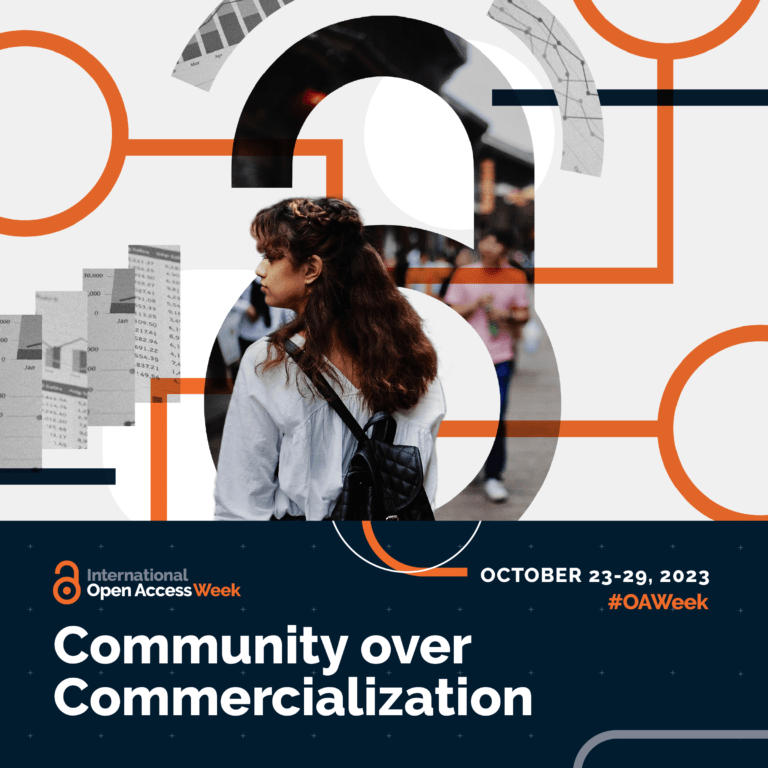We loved this Open Access Australasia blog post by Richard White, Chair of the Open Access Australasia OA Week 2023 organising group, originally published on 12 July 2023.
Richard is also a member of the International OA Week organising committee and the Manager, Copyright & Open Access at University of Otago.
I vividly remember a senior researcher telling me a few years ago, as we were talking about making versions of our work available openly in repositories, that they didn’t need to worry about that because everyone who needed to had access to their publications.* Frankly I was flabbergasted at such a statement of privilege and assumption. I am afraid I didn’t come up with a counter argument to convince that person that there was no way they could possibly know who might be interested in their work. Still, that conversation has stayed with me, and this year’s Open Access Week theme resonates with how I felt about it.

Let’s ask that question again, then: what does the word “community” mean to you in the context of teaching and research? It’s true that many of us will first think about the disciplinary or professional communities we work with. Increasingly, though, we’re broadening our thinking. It might be professionals, teachers, policy makers, businesses and innovators, non-public-sector research organisations, citizen scientists, not to mention all the institutions, researchers and students around the world that cannot afford subscription access. Could it even mean the people or local communities who have contributed to our work or the people who might benefit from our work? If we tell people – especially those we’re writing about or working for – about our work in ways that require payment we should ask ourselves the question: are we doing research for us or for them?
In broadening the communities we want to engage with, however, we have a problem; we’re hindered by the systems we have built. Checking the COKI Open Access Dashboard, we can see that only about 40% of research publications by authors from Aotearoa and Australia from the past 20 years are free to read.** I say “we” have built them because we cannot absolve ourselves of the responsibility for these systems, even though we might complain that “Big Publishing” made them for us.
The theme for this year’s OA week, running from October 23 to 29, is community over commercialisation. This theme was chosen by SPARC’s international OA week advisory committee to encourage conversation about the approaches to open scholarship that prioritise the interests of the public and the academic community.
The UNESCO Recommendation on Open Science, adopted by its 193 members, highlights the need to prioritise community over commercialisation. It calls on members to ensure that science does not involve the “unfair and/or inequitable extraction of profit from publicly funded scientific activities” and to support “non-commercial publishing models and collaborative publishing models with no article processing charges.”
All this should not be reduced to: commercialism = bad. Many of the institutions we work for explicitly encourage commercialism and, naturally, commercial entities are constantly developing innovative ways of doing things. The distinction to make, perhaps, is that ideally investment should serve the needs of the community in sustainable ways.
For Australasian OA week this year, we’re planning a series of topics and discussions, with a star-studded cast of speakers, panellists and experts, that we hope will provoke discussion and debate. Naturally, our focus will be on our corner of the world, examining questions like these:
- What would community ownership of the scholarly communication ecosystem look like? What about a research system centred on indigenous knowledge?
- How can we ensure our knowledge is made as widely available as possible in ways that are sustainable? What about book publishing and open educational resources, which often play second-fiddle to journal publications in OA conversations?
- What safeguards need to be in place to ensure knowledge is used appropriately?
- What opportunities and challenges does the emergence of generative AI (controlled by huge commercial entities) pose for open knowledge?
We’re hoping the sessions will be not just food for thought but also provide some practical opportunities to work together and meet people. We are looking forward to it!
* Having just checked this person’s publications I am sad to report that, even in 2023, only 20 percent are free-to-read, which is much lower than the average for New Zealand researchers (which is about half of publications being open).
** The COKI OA Dashboard shows OA rates for Aotearoa and Australia over the last 20 years as 38% and 42% respectively. [Curtin Open Knowledge Initiative Open Access Dashboard. https://open.coki.ac/ Accessed 4 July 2023]
Attributions:
- Original post – “What does the word “community” mean to you in the context of teaching and research?” by Richard White and Open Access Australia, shared under a Creative Commons Attribution 4.0 licence.
- Small parts of this blog post were adapted from the English announcement of the theme from www.openaccessweek.org/theme/en (CC BY 4.0).

